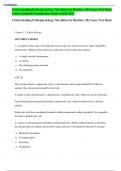Exam (elaborations)
Test Bank for Understanding Pathophysiology 7th Edition by Sue Huether, Kathryn McCance 9780323639088 Chapter 1-44 Complete Guide.
- Course
- Institution
- Book
Test Bank for Understanding Pathophysiology 7th Edition by Sue Huether, Kathryn McCance 9780323639088 Chapter 1-44 Complete Guide.
[Show more]



